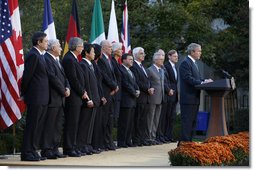
 |
For Immediate Release
Office of the Press Secretary
October 11, 2008
President Bush Meets with G7 Finance Ministers to Discuss World Economy
Rose Garden
7:54 A.M. EDT
THE PRESIDENT: Thank you all very much. Good morning. Secretary Paulson, Secretary Rice and I just had a productive discussion with finance ministers of America's partners in the G7 -- Canada, France, Germany, Great Britain, Italy, and Japan. I'm pleased to be with Prime Minister Junker of Luxembourg, who is the President of the Eurogroup of countries, Managing Director Strauss-Kahn of the International Monetary Fund, President Zoellick of the World Bank, Chairman Draghi of the Financial Stability Forum. Thank you all for coming.
 I appreciate the spirit and common purpose that these leaders have
brought to Washington. We recognize that the turmoil in the financial
markets is affecting all our citizens. Citizens are rightly concerned
about the crisis. And we understand that in dealing with the financial
crisis, we're really helping people be able to have a better future
themselves.
I appreciate the spirit and common purpose that these leaders have
brought to Washington. We recognize that the turmoil in the financial
markets is affecting all our citizens. Citizens are rightly concerned
about the crisis. And we understand that in dealing with the financial
crisis, we're really helping people be able to have a better future
themselves.
In my country, it is important for our citizens to have understood that which affects Wall Street affects Main Street as well. And all of us recognize that this is a serious global crisis and, therefore, requires a serious global response for the good of our people. We resolve to continue our strong efforts to return our economies to the path of stability and long-term growth.
The United States has a special role to play in leading the response to this crisis. That is why I convened this morning's meeting here at the White House, and that is why our government will continue using all the tools at our disposal to resolve this crisis. At our meeting, Secretary Paulson and I described the bold actions the United States has taken over the past few weeks:
To help thaw frozen markets, the Federal Reserve has taken unprecedented measures to boost liquidity. The Securities and Exchange Commission has cracked down on abusive practices in the markets. Federal agencies have significantly expanded the amount of money insured in bank and credit union accounts. My administration worked with the Congress to pass legislation authorizing the government to recapitalize banks by purchasing troubled assets or providing insurance or purchasing equity in financial institutions. These extraordinary efforts are being implemented as quickly and as effectively as possible. The benefits will not be realized overnight. But as these actions take effect, they will help restore stability to our markets and confidence to our financial institutions.
I'm pleased that other G7 countries are making strong -- are taking strong measures. Finance ministers and central bankers have acted to provide new liquidity to markets, strengthen financial institutions, protect citizens' savings, and ensure fairness and integrity in the financial markets.
As our nations confront challenges unique to our individual financial systems, we must continue to work collaboratively and ensure that our actions are coordinated. The joint interest rate cut earlier this week was a good example of effective cooperation. Yesterday, G7 finance ministers and central bankers agreed to a plan of action:
The G7 nations have pledged to take decisive action to support systemically important financial institutions and prevent their failure, provide robust protection for retail bank deposits, and ensure financial institutions are able to raise needed capital. We've agreed to implement strong measures to unfreeze credit, ensure access to liquidity, and help to restart the secondary markets for mortgages and other assets. We've all agreed that the actions we take should protect our taxpayers. And we agreed that we ought to work with other nations such as those that will be represented this afternoon in the G20 forum.
As our nations carry out this plan, we must ensure the actions of one country do not contradict or undermine the actions of another. In our interconnected world, no nation will gain by driving down the fortunes of another. We're in this together. We will come through it together.
I'm confident that the world's major economies can overcome the challenges we face. There have been moments of crisis in the past when powerful nations turned their energies against each other, or sought to wall themselves off from the world. This time is different. The leaders gathered in Washington this weekend are all working toward the same goals. We will stand together in addressing this threat to our prosperity. We will do what it takes to resolve this crisis. And the world's economy will emerge stronger as a result.
Thank you very much.
END 8:00 A.M. EDT